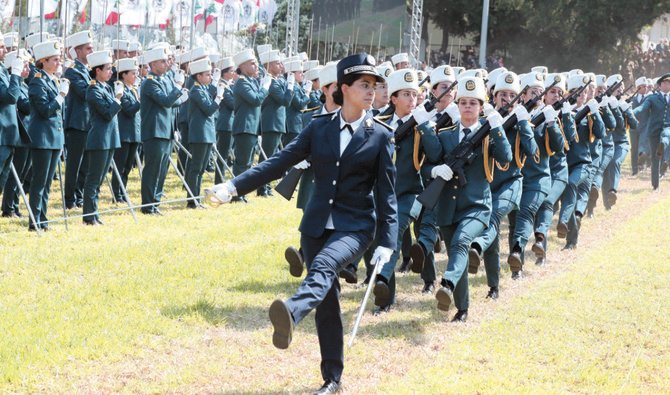
By Najia Houssari — BEIRUT: The celebration of the 77th Lebanese Army Day on Monday witnessed over 40 female officers graduating from the Lebanese Army Military Academy. Female officer Lt. Angie Khoury was the top cadet in this year’s graduating class. She read out the oath and all graduates repeated it after her. The gender split reflects “the progress of Lebanese society and the change in the stereotypical picture of women,” said the National Commission for Lebanese Women in a statement. “It also shows that the Lebanese Army appreciates women’s capabilities and qualifications, and opens the door for them to reach decision-making positions in the fields of security and defense,” the commission added.
Women’s access to senior positions in state security is one of the envisaged objectives in the national plan to implement the UN Security Council decision 1325 on women, peace and security. A ministerial decree was issued in 1989 including applicable provisions related to the recruitment and service of Lebanese women in the army, in line with women’s rights to equality, in addition to a defense law that grants all Lebanese the right to volunteer to serve in their country’s military. Over time, women’s roles were no longer limited to administrative work. According to the Lebanese Army’s Orientation Directorate, today “women occupy many positions in combat units and they proved their success in all tasks assigned to them.” The total number of women who graduated from the academy reached 46 out of 121 graduates — 40 from the ground forces, four from the air forces, and two from the maritime forces.
The Lebanese parliament witnessed last May a relative increase in the number of female members as a result of the parliamentary elections, bringing their number to eight compared to six in 2018. However, the stances of these women, be it in parliament, on TV channels or on social media platforms, have often been mocked, especially by their male colleagues or male activists and politicians on social media. Tensions flared up again when MP Kabalan Kabalan mocked the family name of MP Cynthia Zarazir from the Forces of Change bloc. Yaacoubian defended her colleague by telling Berri that “one of his bloc’s MPs is bullying our colleague.” A former female minister, who spoke to Arab News on condition of anonymity, took a more critical view: “If some women are seeking populism and demagoguery in parliament, it is their problem. “We worked as ministers and MPs and were never subjected to bullying and mockery. Berri deals with all the MPs in his way but this doesn’t mean that he targets women alone.”
But feminist Hayat Mershad believes that “the ruling class in Lebanon has a patriarchal tendency toward women.” She said the presence of women in public affairs is still limited, as the number of current female MPs constitutes 6.5 percent of the total number of MPs, adding that “this achievement came after years of struggle and violence targeting women trying to work in politics.” Mershad said: “Women are always criticized for being women, not for their ideas and proposals. This attitude exists and is linked to the existing political parties. The head of the party is seen as everyone’s leader and father and rules those beneath him. Women and young people don’t have the chance to assume a serious role in these parties.” Mershad described women’s participation in the military as “a very important step that we weren’t seeing before.” She added: “We don’t know whether it is because the number of male members in the army is decreasing as a result of their low salaries, or because of men’s migration from Lebanon to work abroad.”
In a recent Carnegie Foundation research paper, Joumana Zabaneh, a programme management specialist at UN Women Lebanon, said that “women’s participation in the Lebanese Army has had a significant impact on maintaining the Lebanese people’s confidence and reducing the risk of sexual harassment of women in vulnerable groups. The more the number of female members in the army, the more responsive, inclusive and aware of gender-related issues the institution becomes.” The army said female recruits will be assigned “combat missions and combat support missions. As they gain frontline leadership experience, they will gradually become eligible for leadership positions over the next 30 years, and thus may succeed in bringing about major strategic transformations from within the force.” It added: “Who knows, probably by 2050, a woman might become the chief for the first time.”



